Thousands of geographers will convene in Boston from April 5-9 to discuss geographic research, education, and innovation, and form new collaborations with like- and differently-minded scholars, researchers, and practitioners. They will strive to interpret, understand, and respond to the current political climates using their expertise in and perspectives of geography and its many diverse sub-disciplines.
Boston, a city central to the history and development of democracy in the United States, will provide a fitting backdrop for the 2017 AAG Annual Meeting and much needed thoughtful discussions on human rights, social justice, immigration, and countless other relevant topics. The city’s history of defiance and pursuit of freedom are inherent aspects of Boston’s sense of place. It should come as no surprise, then, that Boston has taken a stand against the decrees of the new president.
Boston, like many cities across the United States, has taken steps to lawfully resist Donald Trump’s recent executive order, which bans citizens from seven Muslim-majority nations from immigrating to the US. “I want to say directly to anyone who feels threatened today, or vulnerable, you are safe in Boston,” said Mayor Martin J. Walsh. “We will do everything lawful in our power to protect you.”
“I want to say directly to anyone who feels threatened today, or vulnerable, you are safe in Boston. We will do everything lawful in our power to protect you.”
Thanks to the Trust Act passed in 2014, Boston is able to offer immigrants some protection from federal overreach by prohibiting its police from detaining anyone based on their immigration status without a criminal warrant. Boston Mayor Walsh released a statement regarding the orders:
“Preventing people from entering this country based solely on faith runs counter to everything we stand for as Americans. Let’s be clear: this is not an effective way to combat terrorism and increase homeland security.
“It is a reckless policy that is rooted in fear, not substance, and further divides us as a nation and a world. It is simply morally wrong. As Americans, we must move forward together as a country proud of our diverse heritage, and find real solutions to the challenges we face.”
Moreover, it should be of little surprise that Boston moves to protect undocumented immigrants. It is, after all, a city of immigrants. In fact, it was the Immigration Act of 1965 that led to substantial changes in the demographic makeup of Boston. The percentage of foreign-born residents doubled by 2010 with these newer waves of immigration representing greater diversity than Boston experienced in previous decades.
Boston, however, is not alone. Other cities throughout the state of Massachusetts, such as Cambridge, Salem, Somerville, Chelsea, Orleans, Northampton, and Springfield have codified their sanctuary status or are considering it. In addition, the Massachusetts Attorney General and State Senate have also expressed their opposition to this policy. Attorney General Maura Healey joined with other attorneys general in a lawsuit, and the Massachusetts Senate passed a resolution strongly condemning the travel ban.
“The Senate passed this resolution [Feb. 2] in solidarity with those affected by the order, and sends an important message that the Massachusetts state Senate rejects discrimination based on race, ethnicity, nationality, gender or religion,” said state Sen. Kathleen O’Connor Ives.
Then late last week, a Seattle federal judge blocked the Administration’s travel ban. This, as they say in journalism, is a developing story. And Boston is poised to offer a historical perspective, as well as a first-hand look at geopolitical discourse as it happens. This makes it all the more meaningful that geographers, who identify the significance of all places, should be coming to gather in this particular place at this particular time.
—
David L. Coronado
DOI: 10.14433/2017.0003
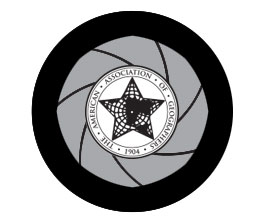 Would you like to know more about the work of the AAG throughout the year, beyond the Annual Meeting? Are you interested in learning about additional resources and opportunities available to you through the AAG? Check out a new feature at the 2017 Annual Meeting in Boston, our AAG Snapshots series!
Would you like to know more about the work of the AAG throughout the year, beyond the Annual Meeting? Are you interested in learning about additional resources and opportunities available to you through the AAG? Check out a new feature at the 2017 Annual Meeting in Boston, our AAG Snapshots series!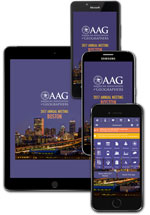 Get the most from your AAG 2017 Boston experience with the mobile app. Enjoy an interactive experience on your Apple, Android, BlackBerry and other mobile devices during the annual meeting. If you’re a laptop user or have a Windows phone, there’s also a Web version for your devices.
Get the most from your AAG 2017 Boston experience with the mobile app. Enjoy an interactive experience on your Apple, Android, BlackBerry and other mobile devices during the annual meeting. If you’re a laptop user or have a Windows phone, there’s also a Web version for your devices.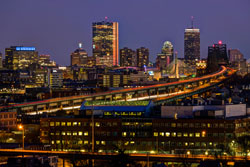
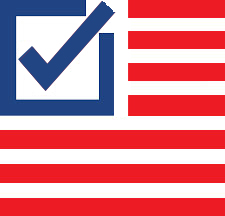 The 2016 elections in the United States may impact geography and our nation in the years ahead in many ways. Every year, the AAG addresses “late-breaking” events through special sessions at our Annual Meetings. During our upcoming 2017 AAG Annual Meeting in Boston, the AAG will hold a series of sessions within the special track, The 2016 U.S. Elections: Implications for Geography and Beyond, focused on analysis and research on the 2016 election, and what the results may mean for geography, the nation, and our planet.
The 2016 elections in the United States may impact geography and our nation in the years ahead in many ways. Every year, the AAG addresses “late-breaking” events through special sessions at our Annual Meetings. During our upcoming 2017 AAG Annual Meeting in Boston, the AAG will hold a series of sessions within the special track, The 2016 U.S. Elections: Implications for Geography and Beyond, focused on analysis and research on the 2016 election, and what the results may mean for geography, the nation, and our planet.
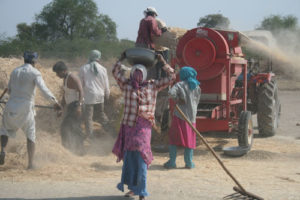 Burgeoning global population along with increasing appetite for high-protein or resource demanding food choices may double demands on world agriculture by 2050. At the same time groundwater depletion and climate change are negatively impacting the availability of sufficient water to meet agricultural and domestic freshwater demands in many regions. Compounding these challenges are socioeconomic forces, including armed conflicts and state collapse that negatively affect agricultural productivity, food transference and water resources. The challenges to food and water security over the 21st century represent an increasing and potentially existential threat to global society. These issues are fundamentally geographical in nature and form a central research and educational focus of geography and the AAG special theme.
Burgeoning global population along with increasing appetite for high-protein or resource demanding food choices may double demands on world agriculture by 2050. At the same time groundwater depletion and climate change are negatively impacting the availability of sufficient water to meet agricultural and domestic freshwater demands in many regions. Compounding these challenges are socioeconomic forces, including armed conflicts and state collapse that negatively affect agricultural productivity, food transference and water resources. The challenges to food and water security over the 21st century represent an increasing and potentially existential threat to global society. These issues are fundamentally geographical in nature and form a central research and educational focus of geography and the AAG special theme.
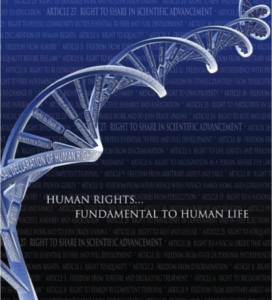 The special theme, Mainstreaming Human Rights in Geography and the AAG, will feature 50 sessions with more than 250 presentations at the intersection of human rights and geography within the 2017 AAG Annual Meeting and will build on the AAG’s decade-long initiatives in this area. Speakers from leading international human rights organizations, academia, government, and NGOs will address human rights challenges around the world.
The special theme, Mainstreaming Human Rights in Geography and the AAG, will feature 50 sessions with more than 250 presentations at the intersection of human rights and geography within the 2017 AAG Annual Meeting and will build on the AAG’s decade-long initiatives in this area. Speakers from leading international human rights organizations, academia, government, and NGOs will address human rights challenges around the world.
 James Hanson, known for his climate research and his Congressional testimony on climate change that raised awareness of global warming, will deliver a featured talk, moderated by AAG President Glen MacDonald, on Friday, April 7, from 10:00 a.m. – 11:40 a.m. in Room 210 at the Hynes Convention Center.
James Hanson, known for his climate research and his Congressional testimony on climate change that raised awareness of global warming, will deliver a featured talk, moderated by AAG President Glen MacDonald, on Friday, April 7, from 10:00 a.m. – 11:40 a.m. in Room 210 at the Hynes Convention Center.
 Rush Holt, chief executive officer of the American Association for the Advancement of Science (AAAS), will deliver a featured talk entitled, “Advancing Science in the Public Arena,” on Thursday, April 6, from 11:50 a.m. – 1:10 p.m. in Room 103 of the Hynes Convention Center.
Rush Holt, chief executive officer of the American Association for the Advancement of Science (AAAS), will deliver a featured talk entitled, “Advancing Science in the Public Arena,” on Thursday, April 6, from 11:50 a.m. – 1:10 p.m. in Room 103 of the Hynes Convention Center.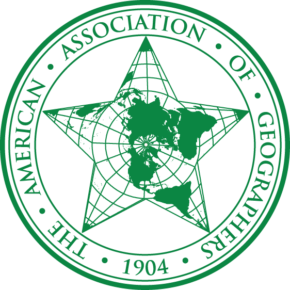 The AAG will refund the conference registration fees for any AAG member or attendee who is a citizen of one of the seven countries affected by the U.S. Travel Ban and who by virtue of being outside the United States at this time will not be able to attend the AAG Annual Meeting in Boston. In the interest of giving such members a voice at the conference we also will allow for their abstracts to remain in the program and their oral presentations to be delivered by a registered member able to attend the meeting or their posters to be displayed should they be able to send their posters to the meeting. The AAG also will provide for a Skype or similar teleconference option for these affected participants to present their paper. We will need notification in advance if members affected by the Travel Ban wish to have a surrogate present their talk or poster, or wish to deliver their paper via teleconference.
The AAG will refund the conference registration fees for any AAG member or attendee who is a citizen of one of the seven countries affected by the U.S. Travel Ban and who by virtue of being outside the United States at this time will not be able to attend the AAG Annual Meeting in Boston. In the interest of giving such members a voice at the conference we also will allow for their abstracts to remain in the program and their oral presentations to be delivered by a registered member able to attend the meeting or their posters to be displayed should they be able to send their posters to the meeting. The AAG also will provide for a Skype or similar teleconference option for these affected participants to present their paper. We will need notification in advance if members affected by the Travel Ban wish to have a surrogate present their talk or poster, or wish to deliver their paper via teleconference.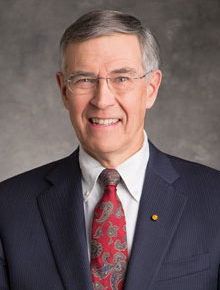 Rush D. Holt, Ph.D., chief executive officer of the American Association for the Advancement of Science (AAAS), will deliver a featured talk on emerging opportunities and challenges that science will face in the coming years at the AAG Annual Meeting in Boston on April 6, 2017. Holt is a Phi Beta Kappa graduate of Carleton College in Northfield, Minnesota, and he holds M.A. and Ph.D. degrees in physics from New York University. He is an elected fellow of AAAS, the American Physical Society, and Sigma Xi, and he holds honorary degrees from multiple universities. He is also a former Congressman and Jeopardy Champion.
Rush D. Holt, Ph.D., chief executive officer of the American Association for the Advancement of Science (AAAS), will deliver a featured talk on emerging opportunities and challenges that science will face in the coming years at the AAG Annual Meeting in Boston on April 6, 2017. Holt is a Phi Beta Kappa graduate of Carleton College in Northfield, Minnesota, and he holds M.A. and Ph.D. degrees in physics from New York University. He is an elected fellow of AAAS, the American Physical Society, and Sigma Xi, and he holds honorary degrees from multiple universities. He is also a former Congressman and Jeopardy Champion.